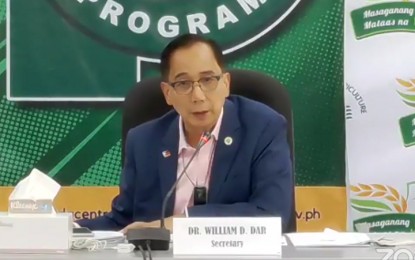
(PNA file photo)
MANILA – The Department of Agriculture (DA) on Tuesday said the new Executive Order (EO) that imposes a price ceiling on pork and chicken products in the National Capital Region (NCR) is likely to take effect on February 8.
“The price ceiling will effectively be enforced by Feb. 8 this year by all the institutions involved,” Agriculture Secretary William Dar told the House committees on Agriculture and Food as well as Trade and Industry.
The DA and livestock stakeholders will meet to discuss the repercussions of EO 124 to the industry. The new EO stated that prices of kasim/pigue should be at PHP270 per kilo, liempo at PHP300 per kilo, and dressed chicken at PHP160 per kilo for 60 days.
In the afternoon briefing, DA spokesperson Assistant Secretary Noel Reyes mentioned that the Secretary said it will likely occur on February 8.
DA's Assistant Secretary for agribusiness Kristine Evangelista also shared that they are taking into consideration to give producers and traders the grace period to earn back their capital.
"Upon our monitoring yesterday, in Commonwealth market, meat dealers said the prices of carcass went down to PHP285 from PHP310, that was without government intervention. Now that the EO is announced, we told them that their concerns are taken into consideration i.e. grace period, some of them requested for that. We wanted to give them the reassurance that they will recover their capital investments, ang mga negosyante (the businessmen) are legitimate part of the value chain (the businessmen are a legitimate part of our value chain). At the same time, they have given us their word that they would adjust the prices for the consumers' benefit," Evangelista said.
She added that the gap from the announcement to the implementation can also serve as a grace period for traders and other stakeholders.
After the Congress hearing, the DA is doing attendant arrangements to coordinate with the Departments of Trade and Industry (DTI) and Interior And Local Government (DILG), Metro Manila Development Authority (MMDA), and Metro Manila Council member-cities, as well as municipalities to ensure the efficient implementation of the EO.
DA has so far implemented the following measures to address the concern: provision of financial assistance to hog raisers affected by the ASF; the depopulation of affected hogs; surveillance activities and border control; heightened implementation of the Bantay ASF sa Barangay (BABAY ASF) program; and stakeholder engagement and consultation.
Additionally, the DA also proposed increasing the minimum access volume of its meat import allocation from 54,000 metric tons (MT) to 162,000 MT. (PNA)
